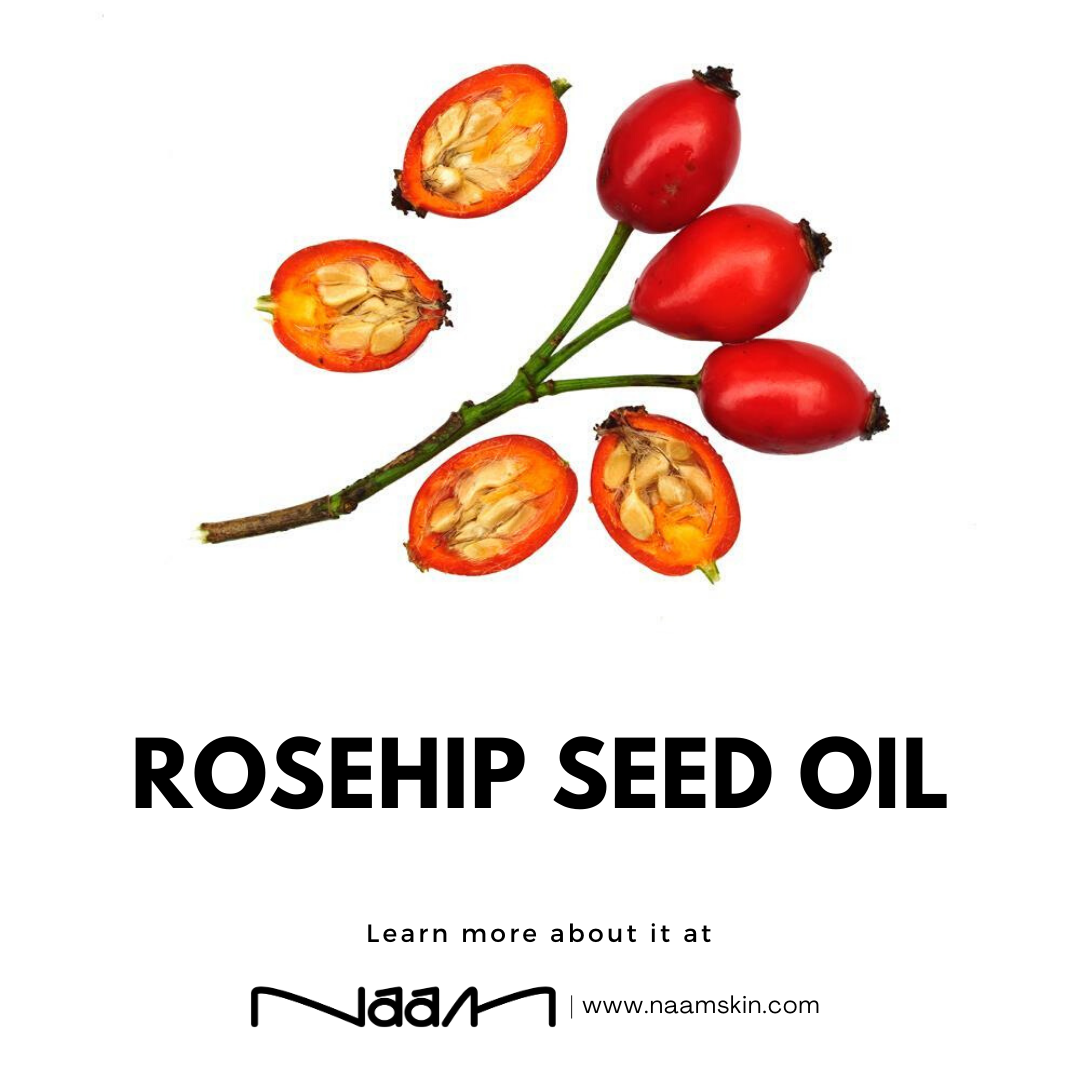Rosehip Seed Oil
Rosehip seed oil is extracted from the seeds of the fruit of a rose bush (Rosa mosqueta or Rosa rubiginosa) that grows wild in the southern Andes. It’s considered a carrier oil (not an essential oil). That means you can apply it directly to the skin without diluting it, unlike essential oils. In fact, if you were to make an essential oil blend to apply to your skin, you might want to use rosehip seed oil as the carrier for said blend.
The average single rose hip contains 20 percent more Vitamin C than the average single orange! But even better, rose hips also contain plentiful levels of Vitamins A and E, omega-3 and omega-6 fatty acids and other anti-inflammatory and anti-oxidant nutrients.
Benefits of Rosehip Seed Oil
It Hydrates
Hydration is essential for soft, supple skin. Lack of hydration can be a problem during extreme weather, or as skin ages. Rosehip oil contains a wealth of essential fatty acids, including linoleic and linolenic acid. Fatty acids help to keep cell walls strong so that they don’t lose water. The many fatty acids in rosehip oil make it an excellent option for hydrating dry, itchy skin. The skin also easily absorbs the oil, allowing its antioxidants to travel deep into the skin’s layers.
It Moisturizes
Moisturizing helps lock in your skin’s natural hydration and any added oils.
A 2015 study using rosehip powder suggests that rosehips offer several anti-aging properties, including the ability to keep skin moisturized. Researchers found that participants who took rosehip powder orally experienced noticeable improvements in the overall moisture of their skin.
You may also receive these benefits by applying rosehip oil topically. Rosehip oil is a dry, or nongreasy, oil. This makes it a great natural moisturizer for all skin types.
It Helps Exfoliate and Helps Brightens Skin
Natural exfoliation with rosehip oil can help reduce dullness and leave you with glowing, vibrant skin. That’s because rosehip oil is high in vitamins A and C. Vitamin A, or retinol, encourages skin cell turnover. Vitamin C also aids in cell regeneration, boosting overall radiance.
It Helps Boost Collagen Formation
Collagen is the building block of skin. It’s essential for skin elasticity and firmness. Your body naturally makes less collagen as you age.
Rosehip oil is rich in vitamins A and C, which are both necessary for the production of collagen. Rosehip has also been shownTrusted Source to inhibit the creation of MMP-1, an enzyme that breaks down collagen in the body. Research supports these benefits, too. In one 2015 study, researchers found that participants who took rosehip powder orally experienced a noticeable increase in skin elasticity.
It Helps Reduce Inflammation
Rosehip is rich in both polyphenols and anthocyanin, which may help reduce inflammation. It also contains vitamin E, an antioxidant known for its anti-inflammatory effects. With this in mind, rosehip oil may help calm irritation resulting from:
- rosacea
- psoriasis
- eczema
- dermatitis
Protect Against Sun Damage
Cumulative damage from a lifetime of exposure to the sun plays a major role in premature aging. UV exposure can also interfere with the body’s ability to produce collagen.
Rosehip oil contains antioxidants like vitamins A, C, and E. These vitamins have been shown to synergistically combat visible sun damage. They may also help prevent photoaging. With this in mind, rosehip oil may be used to help reduce the negative effects of UV exposure. But it shouldn’t be used in place of sunscreen. Talk to your doctor or dermatologist about how you can safely use both in your skincare routine.
It Helps Reduce Hyperpigmentation
Hyperpigmentation occurs when excess melanin forms dark spots or patches on the skin. This can result from a number of factors, including:
- sun exposure
- hormonal changes, such as with pregnancy or menopause
- certain medications, including birth control pills and chemotherapy drugs
Rosehip oil is rich in vitamin A. Vitamin A is made up of several nutritional compounds, including retinoids. Retinoids are known for their ability to reduce hyperpigmentation and other visible signs of aging with regular use. Rosehip oil also contains both lycopene and beta carotene. These ingredients are said to have skin-lightening properties, making them staple ingredients in many skin-lightening products.
Animal studies indicate that rosehip extract does contain melanin-reducing properties, and may warrant further study for its use on humans.
Reduce Scars and Fine Lines
Rosehip oil is rich in essential fatty acids and antioxidants, which are integral for tissue and cell regeneration in the skin. It’s no wonder that the oil has long been used as a folk remedy for wound healing, as well as the reduction of scars and fine lines.
One 2015 study on rosehip powder showed a significant reduction in the appearance of fine lines around the eyes, also known as crow’s feet, after eight weeks of treatment. Participants in this study consumed the powder orally.
In a separate 2015 study, participants with post-surgical scars treated their incision site twice per day with topical rosehip oil. After 12 weeks of use, the group using rosehip oil experienced significant improvements in scar color and inflammation when compared to the group who received no topical treatment.
Boost Immunity
Rosehip oil is rich in antioxidants and polyunsaturated fatty acids, like linoleic acid, which are imperative for preventing the breakdown of cell membranes in the skin. Strong, healthy cells act as a barrier to prevent bacteria from invading the skin, which can lead to outbreaks and infections.
In both animal and human studies, rosehip powder has been shown to bolster the strength and longevity of the skin’s cells. Rosehip powder was also shown to reduce the production of MMP-1, an enzyme that breaks down cell structures like collagen.

